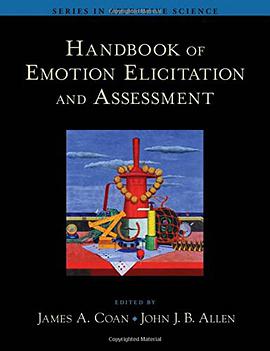Handbook of Emotion Elicitation and Assessment
豆瓣
Coan, James A. (EDT) / Allen, John J. B., Ph.D. (EDT)
简介
Emotion research has become a mature branch of psychology, with its own standardized measures, induction procedures, data-analysis challenges, and sub-disciplines. During the last decade, a number of books addressing major questions in the study of emotion have been published in response to a rapidly increasing demand that has been fuelled by an increasing number of psychologists whose research either focus on or involve the study of emotion. Very few of these books, however, have presented an explicit discussion of the tools for conducting research, despite the facts that the study of emotion frequently requires highly specialized procedures, instruments, and coding strategies, and that the field has reached a place where a large number of excellent elicitation procedures and assessment instruments have been developed and validated. The Handbook of Emotion Elicitation and Assessment corrects this oversight in the literature by organizing and detailing all the major approaches and instruments for the study of emotion.It is the most complete reference for methods and resources in the field, and will serve as a pragmatic resource for emotion researchers by providing easy access to a host of scales, stimuli, coding systems, assessment tools, and innovative methodologies. This handbook will help to advance research in emotion by encouraging researchers to take greater advantage of standard and well-researched approaches, which will increase both the productivity in the field and the speed and accuracy with which research can be communicated.
contents
1. Emotion Elicitation Using Films
Jonathan Rottenberg, Rebecca D. Ray, and James J. Gross
2. The International Affective Picture System (IAPS) in the study of emotion and attention
Margaret M. Bradley and Peter J. Lang
3. The Directed Facial Action Task: Emotional Responses without Appraisal
Paul Ekman
4. Emotional Behaviors As Emotional Stimuli
James D. Laird and Sarah Strout
5. Probing unconscious emotional processes: On becoming a successful masketeer
Stefan Wiens and Arne Öhman
6. Social Psychological Methods of Emotion Elicitation
Eddie Harmon-Jones, David M. Amodio, and Leah R. Zinner
7. Emotion Elicitation Using Dyadic Interaction Tasks
Nicole A. Roberts, Jeanne L. Tsai, and James A. Coan
8. Combining Music with Thought to Change Mood
Eric Eich, Joycelin T.W. Ng, Dawn Macaulay, Alexandra D. Percy, and Irina Grebneva
9. Emotion elicited by primary reinforcers, and following stimulus-reinforcement association learning
Edmund T. Rolls
10. Emotion Elicitation with Neurological Patients
Robert W. Levenson
11. Assessing Positive and Negative Affect via Self Report
Elizabeth K. Gray and David Watson
12. THE INFORMATION PROCESSING APPROACH TO EMOTION RESEARCH
Edward Wilson, Colin MacLeod, and Lynlee Campbell
13. Observer-Based Measurement of Facial Expression with the Facial Action Coding System
Jeffrey F. Cohn, Zara Ambadar, and Paul Ekman
14. Use of Automated Facial Image Analysis for Measurement of Emotion Expression
Jeffrey F. Cohn and Takeo Kanade
15. Measuring Emotion-Related Vocal Acoustics
Michael J. Owren and Jo-Anne Bachorowski
16. THE SPECIFIC AFFECT CODING SYSTEM (SPAFF)
James A. Coan and John M. Gottman
17. Continuous Measurement of Emotion: The Affect Rating Dial
Anna Marie Ruef and Robert W. Levenson
18. Assessing Understanding and Appraisals during Emotional Experience:
The Development and Use of the Narcoder
Nancy L. Stein and Marc W. Hernandez
19. The Time Sampling Diary (TSD) of Emotional Experience in Everyday Life Situations
Hermann Brandstätter
20. Methodological Considerations in the Study of Emotion across Cultures
David Matsumoto and Seung Hee Yoo
21. Considerations in Studying Emotion in Infants and Children
Heather A. Henderson and Nathan A. Fox
22. Conceptual, Theoretical, and Methodological Issues in Inferring Subjective Emotion Experience: Recommendations for Researchers
Lis Nielsen and Alfred W. Kaszniak
23. Studying Emotion in Animals: Methods, Materials, and Training
L.A. Parr and K. M. Gothard
24. THE PSYCHOPHYSIOLOGICAL LABORATORY
John J. Curtin, David L. Lozano, and John J.B. Allen
25. Investigating Human Emotion with Lesions and Intracranial Recording
Ralph Adolphs
26. Functional Magnetic Resonance Imaging and the Study of Emotion
Catherine J. Norris, James A. Coan, and Tom Johnstone